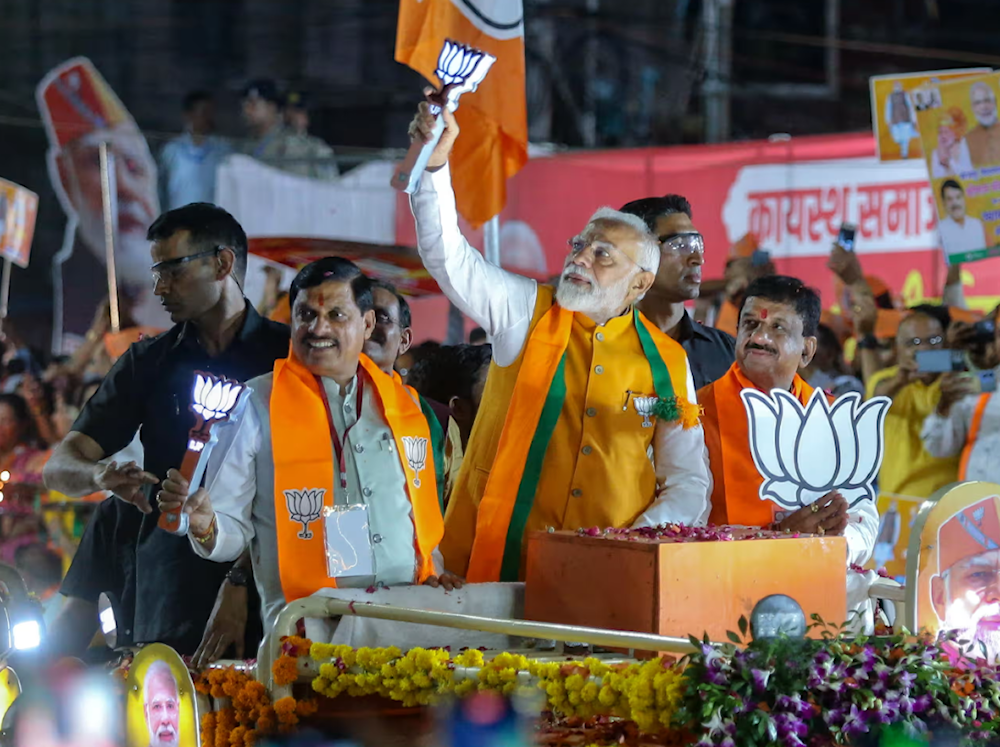Modi and rivals trade accusations as voter turnout slumps
At the close of polling, the estimated voter turnout for Friday was 61%, down from 65% in the first phase last week.
-

Narendra Modi, centre, greets supporters during a roadshow in Bhopal before the second phase of voting.(AFP)
India has held the second round of elections, with Prime Minister Narendra Modi and his challengers accusing each other of religious discrimination and dangers to democracy as voter turnout falls.
The election is the largest in the world, with nearly 1 billion individuals eligible to vote in the seven-phase election that ends on June 1.
Analysts believe that PM Narendra Modi’s Bharatiya Janata Party (BJP) is due to claim victory and score him a third term in office while opposition members have established a coalition of more than two dozen parties, pledging further affirmative action, more giveaways, and an end to what they call Modi's dictatorial regime.
At the close of polling, the estimated voter turnout for Friday was 61%, down from 65% in the first phase last week and 68% in the second phase five years ago.
The Election Commission and political parties are afraid that abnormally hot weather and weddings in certain areas of the nation would reduce attendance.
Analysts also think Modi's loyal Hindu nationalist base may not vote due to overconfidence, resulting in reduced turnout.
The campaign has heated up since the first phase of voting on April 19, with Modi accusing Congress of favoring minority Muslims, attempting to undermine affirmative action, and seeking to introduce an inheritance tax.
The Congress has refuted the claims, claiming that Modi was afraid of losing and was using divisive language to divert people' attention away from serious concerns like unemployment, increasing prices, and rural hardship.
Rahul Gandhi, the former Congress president and the party's face, was among the 1,200 candidates running for election on Friday.
At an election rally in the Karnataka region that votes next week, Gandhi expressed that for the first time in India, "one party and one person is trying to finish the constitution and democracy of India."
Congress fell to a record low after being pushed out of office by the BJP in 2014, winning 52 seats in 2019, with Kerala giving the most (15).
The party is anticipated to perform better in Karnataka this year, where it won only one of 28 seats in 2019 but gained ground and beat the BJP in state elections last year.
Modi posted on X that "unparalleled support for NDA is going to disappoint the Opposition even more."
पहले और दूसरे चरण में एकतरफा मतदान से साफ है कि केंद्र में लगातार तीसरी बार भाजपा-एनडीए की मजबूत सरकार बनने जा रही है। महाराष्ट्र के कोल्हापुर में आशीर्वाद देने आए परिवारजनों को नमन करता हूं। https://t.co/O9tuxne6b1
— Narendra Modi (@narendramodi) April 27, 2024
Amid India election, Modi accused of 'hate speech', stirring strife
India's main opposition Congress party filed a complaint to the Election Commission Monday accusing Hindu nationalist Prime Minister Narendra Modi of "blatantly targeting" the country's 200 million Muslim minority in a campaign speech.
In Rajasthan, Modi claimed a previous Congress government had said that "Muslims have the first right over the nation's wealth."
He said if Congress won "it will be distributed among those who have more children. It will be distributed to the infiltrators."
"Do you think your hard-earned money should be given to infiltrators? Would you accept this?"
Modi's remarks have ignited strong criticism from political adversaries and civil society groups, accusing him of exacerbating religious tensions and propagating unfounded conspiracy theories about Muslims.
In its complaint to the Election Commission, the Congress party said the "divisive, objectionable and malicious" comments were targeted at "a particular religious community" and amounted to "blatant and direct violations of electoral laws."
They were "far worse than any ever made by a sitting Prime Minister in the history of India." the complaint stressed.
Since assuming power in 2014 with a Hindu nationalist platform, the BJP has faced allegations of implementing policies and employing rhetoric that discriminates against minorities, particularly Muslims.
Reports suggest an increase in violence and persecution against Muslims, attributed to both state actions and right-wing Hindu vigilante groups. Notably, the BJP has nominated only one Muslim candidate in this election.

 4 Min Read
4 Min Read








